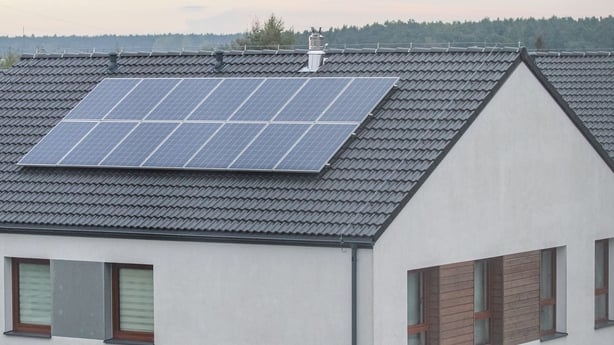Flogas said it is paying the joint highest rate on the market for unused electricity generated by homeowners, businesses and farms using solar panels.
Under its new SolarGen promotion, Flogas is paying 20 cent per kWh for the unused electricity.
The 20 cent per kWh rate is guaranteed until March 2023, Flogas said.
Meanwhile, Bord Gáis Energy is offering its customers, both business and homeowners, 18.5 cent per kWh (excluding VAT) for any excess electricity that they are microgenerating and exporting to the grid under its Microgen Export plan.
Bord Gáis Energy said this is the same as Flogas's 20 cent per KWh (including VAT) rate.
Under the Government's Microgeneration Support Scheme, eligible homeowners using renewable energy like solar panels can sell surplus solar electricity back to their supplier.
The same applies to farmers, business owners and non-profit companies with small amounts of solar panels on their rooftops.
Depending upon certain conditions, Flogas customers with 10 solar panels could be paid up to €238 (including VAT) annually, in the form of a credit on their bills.
Those with 15 solar panels could receive up to €350 (including VAT) annually.
The Flogas SolarGen promotion is open to existing and new customers.
The company said that existing customers using solar panels will automatically have their 20 cent per kWh rate (which includes 9% VAT) backdated to February 15, or from when they first became eligible after this date.
Those looking to switch to Flogas will receive the 20 cent rate following sign up.
In a recent survey, the Solar Energy Association said over one million homes in Ireland could benefit from a solar installation, which would take care of over 30% of the country's energy requirement.
Flogas is calling on the Government to accelerate the level of grant support available for residential solar panel installation.
It is also asking for a review of the current planning regulations and restrictions on businesses looking to do the same, to make it easier for them to do so.
John Rooney, managing director of Flogas Energy, said the company already has hundreds of customers with solar installations who will have bill credits appearing by the end of October 2022.
"Our 20 cent rate for unused electricity is a real incentive for homes and small businesses looking to offset energy bills or those who are seriously considering the move towards solar energy," Mr Rooney said.
"As an energy supplier it is critical that we help our customers to make changes to their use of energy to help reduce their bills and support a greener, more sustainable future," he added.
Meanwhile, the Micro-Renewable Energy Federation has welcomed announcements by some energy companies that they will pay 14 cent per kilowatt hour - or more - for surplus electricity generated.

MREF Chairman Pat Smith said that this development is a welcome and transformative move for micro-generation of renewable power in Ireland.
"Thousands of homes and small businesses with micro-generation can now get a regular payment from their energy provider for the surplus renewable electricity that they are generating on their own premises," Mr Smith said.
"Anyone with a micro-generation system installed should immediately contact their utility provider to ensure they get paid for the surplus power they are generating," he advised.
But he also said the payments being currently offered by utility providers need to better match and track actual market prices.
He said that businesses are being quoted an exceptionally high rate of 50 cent plus per kWh for two-year fixed term contracts for electricity.
"14 cent per kWh for micro generation is nowhere near enough compared to the prices these same utility companies are demanding for the energy they are selling to their customers," he stated.
Mr Smith said the price paid for surplus power generated through micro-generation needs to be much closer to market prices and he called on the Commission for the Regulation of Utilities to ensure that this was the case.

